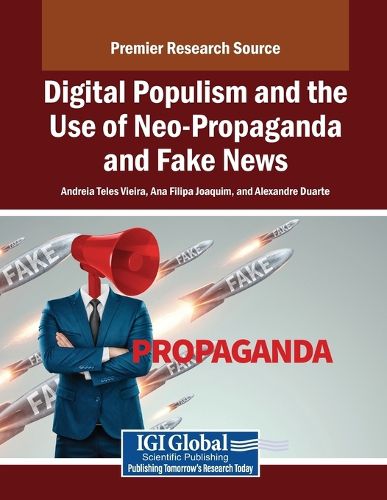Readings Newsletter
Become a Readings Member to make your shopping experience even easier.
Sign in or sign up for free!
You’re not far away from qualifying for FREE standard shipping within Australia
You’ve qualified for FREE standard shipping within Australia
The cart is loading…






This title is printed to order. This book may have been self-published. If so, we cannot guarantee the quality of the content. In the main most books will have gone through the editing process however some may not. We therefore suggest that you be aware of this before ordering this book. If in doubt check either the author or publisher’s details as we are unable to accept any returns unless they are faulty. Please contact us if you have any questions.
As populism grows across global democracies, the integration of new technologies has significantly amplified the use of propaganda techniques and the spread of fake news. Tools like social media and artificial intelligence (AI) make digital technologies privileged vehicles for populist communication. Due to the use of fallacies, propaganda is confused with fake news, though these techniques are broader and based on political strategies to manipulate public opinion. With the advent of new technologies and the ever-increasing incorporation of AI into social life, political parties are facing a form of two-way communication without intermediaries, meaning they can directly reach and influence the public with reduced costs. Understanding the social impact of digital propaganda may help foster political literacy among civil society. Digital Populism and the Use of Neo-Propaganda and Fake News explores various populist parties, aiming to identify and understand their use of propaganda and fake news. It provides a comprehensive, global vision of populism in different nations and examines the communication strategies based on propaganda and disinformation. Covering topics such as social media, computational propaganda, and political rhetoric, this book is an excellent resource for political analysts, journalists, sociologists, government officials, policymakers, researchers, academicians, and more.
$9.00 standard shipping within Australia
FREE standard shipping within Australia for orders over $100.00
Express & International shipping calculated at checkout
This title is printed to order. This book may have been self-published. If so, we cannot guarantee the quality of the content. In the main most books will have gone through the editing process however some may not. We therefore suggest that you be aware of this before ordering this book. If in doubt check either the author or publisher’s details as we are unable to accept any returns unless they are faulty. Please contact us if you have any questions.
As populism grows across global democracies, the integration of new technologies has significantly amplified the use of propaganda techniques and the spread of fake news. Tools like social media and artificial intelligence (AI) make digital technologies privileged vehicles for populist communication. Due to the use of fallacies, propaganda is confused with fake news, though these techniques are broader and based on political strategies to manipulate public opinion. With the advent of new technologies and the ever-increasing incorporation of AI into social life, political parties are facing a form of two-way communication without intermediaries, meaning they can directly reach and influence the public with reduced costs. Understanding the social impact of digital propaganda may help foster political literacy among civil society. Digital Populism and the Use of Neo-Propaganda and Fake News explores various populist parties, aiming to identify and understand their use of propaganda and fake news. It provides a comprehensive, global vision of populism in different nations and examines the communication strategies based on propaganda and disinformation. Covering topics such as social media, computational propaganda, and political rhetoric, this book is an excellent resource for political analysts, journalists, sociologists, government officials, policymakers, researchers, academicians, and more.